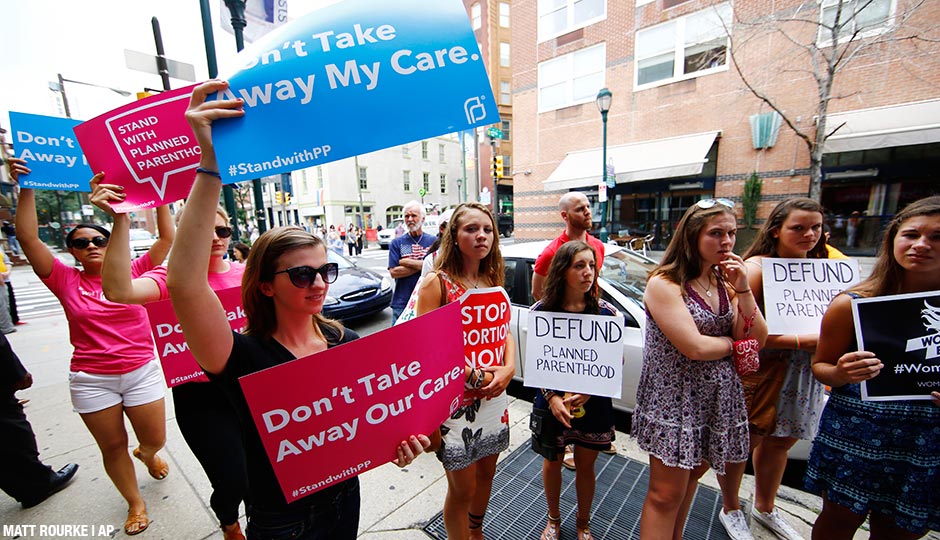Is Pa. House Rushing to Pass a Controversial Abortion Bill?

Opponents and supporters of Planned Parenthood demonstrate Tuesday, July 28, 2015, in Philadelphia.
A controversial bill that would ban abortions after 20 weeks is on the schedule for Wednesday’s house session, according to Steve Miskin, spokesman for Pennsylvania House Majority Leader Dave Reed. At that time a vote may take place or could be postponed. The bill passed out of the House Health Committee on Monday.
In addition to shortening the timeline for legal abortions from the current 24-week cut-off, House Bill 1948 would also ban what it calls “dismemberment abortions” — a procedure currently known as dilation and evacuation, it involves dilating the uterus then removing the fetus using a vacuum and surgical tools. It is one of the main abortion methods for women in their second trimester.
The bill is primarily sponsored by staunch pro-life advocate State Rep. Kathy Rapp (R), of the 65th district. The bill currently has 101 co-sponsors, at least 11 of whom are Democrats. In a November memo sent to house members to gain sponsorship for the bill, Rapp and co-sponsors Rep. Bryan Barbin and Rep. Bryan Cutler wrote one of their primary reasons in creating the bill was because of evidence that the babies are capable of feeling pain at that stage.
“The growing body of scientific evidence shows what many of us have come to know through our own personal experience. That is that babies are capable of feeling pain prior to their birth,” the memo read.
Planned Parenthood, among other organizations, has voiced vehement opposition to the bill. In a public statement, Sari Stevens, executive director of Planned Parenthood PA Advocates, wrote that late-term pregnancies are often provided to women who discover medical complications for the mother or the fetus late into the pregnancy. It stated that in 2014 only one percent of abortions were preformed after 20 weeks in Pennsylvania.
“While it may be a small number of women who face these circumstances, for each and every one of them, the ability to make these personal and private decisions is essential,” Stevens wrote. “This bill would take the complex decision to terminate a pregnancy at a later gestation out of the hands of women and doctors and put it in the hands of legislators.”
Stevens also criticized the bill’s accelerated path through the House. Several reports have been made that the bill is being fast-tracked. The House Health Committee voted against postponing the bill to hold a public discussion period.
“If there wasn’t something to hide there would be a full discussion with medical professionals,” Stevens told Philadelphia magazine. “This is just one way of chipping away at women’s ability [to access abortions].”
Miskin disagreed with claim that the bill has been sped through, stating that the representatives had been working on the bill for several months.
Other opponents of the bill have argued that it’s unconstitutional to ban abortions before 24 weeks and that it is at odds with the Supreme Court decision in Roe v. Wade. The release from Planned Parenthood citied several other states where attempts to move up the abortion cut-off to 20 weeks were blocked, such as in Idaho and Arizona.
Governor Tom Wolf has promised to veto the bill if it reaches him.
“This legislation is an attack on a woman’s right to make her own health decisions, and it goes so far as to prohibit a woman’s right to have an abortion, even in the case of rape or incest. The bill is wrong and Governor Wolf will veto it if it reaches his desk,” Wolf’s press secretary, Jeff Sheridan, wrote.
Members of American Civil Liberties Union also released a statement in opposition of the bill.
“Rather than pursue evidence-based solutions to real women’s health issues, House members are busy implementing abortion restrictions that fly in the face of medical science and put women’s health at risk,” wrote Julie Zaebst, manager of the ACLU of Pennsylvania’s Duvall Reproductive Freedom Project, and chair of the PA Campaign for Women’s Health.
Rapp, who also serves as a co-chair for the General Assembly’s Pro-Life Caucus, sparked some debate in 2012 when she proposed the “Woman’s Right-to-Know Act” which would give “an opportunity for every pregnant woman in Pennsylvania seeking an abortion to view and receive a printed copy of the ultrasound image of her unborn child.” The bill was tabled in March of 2012.
Rapp didn’t respond immediately to requests for comment.
Follow @MariamDembele on Twitter.


